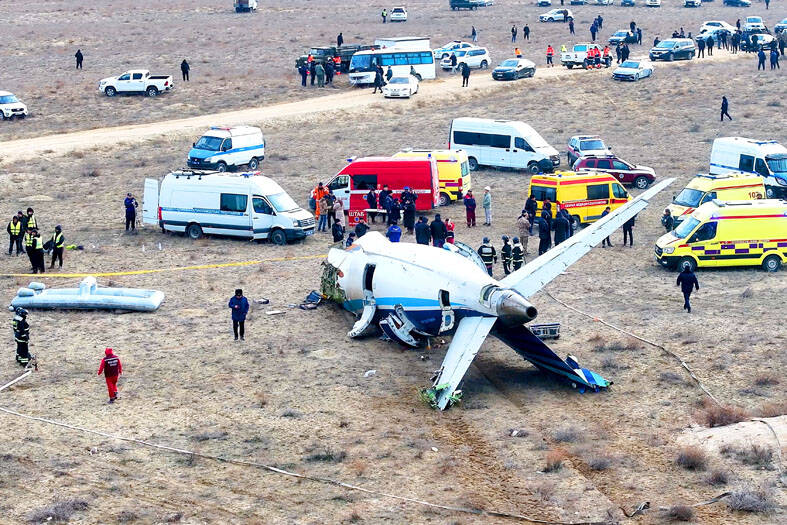Azerbaijani President Ilham Aliyev on Saturday said he wanted Russia to publicly acknowledge that it had accidentally shot down an Azerbaijani passenger plane in December last year, killing 38 people on board, and to punish those responsible.
Russian President Vladimir Putin apologized at the time to Aliyev for what the Kremlin called a “tragic incident” over Russia in which an Azerbaijan Airlines plane crashed after Russian air defenses opened fire against Ukrainian drones.
However, he stopped short of saying Russia had shot down the aircraft.

Photo: AP
Aliyev, speaking at a news conference in the city of Khankendi during an event called the Global Media Forum, made clear that he wanted much more from Moscow, whom he accused of inaction following the downing of the airliner.
“We know exactly what happened — and we can prove it. Moreover, we are confident that Russian officials also know what happened,” Aliyev said. “The real question is: Why didn’t they do what any responsible neighbor should do?”
Azerbaijan expected the incident to be formally acknowledged, for those responsible to be held accountable, for compensation to be paid to victims’ families and those injured, and for Moscow to reimburse the cost of the destroyed aircraft, he said.
“These are standard expectations within the framework of international law and good-neighborly relations,” he added.
Flight J28243, en route from Baku to the Chechen capital, Grozny, crash-landed near Aktau, Kazakhstan, after diverting from southern Russia, where Ukrainian drones were reported to be attacking several cities. Thirty-eight people were killed and 29 survived.
Ties between Moscow and Baku have seriously deteriorated in recent months after Russian police detained a group of ethnic Azerbaijanis living in Russia and accused them of various historic crimes.
Aliyev at the same event said he wanted a transit corridor to be opened between Azerbaijan and its exclave of Nakhchivan that would run via Armenia.
“We are talking about unimpeded state access from Azerbaijan to Azerbaijan. And we understand this literally — we are talking about a connection between parts of one country,” he said.
Azerbaijani train passengers should not be exposed to physical danger from Armenian civilians, whom he accused of throwing stones at such trains in the Soviet era, Aliyev said, calling for “reliable and verifiable” security guarantees.
“This is an absolutely legal and fair demand,” he said.
Armenian Prime Minister Nikol Pashinyan on Wednesday last week said that the US had offered to manage the potential transport corridor.
The potential corridor, which Baku is keen to secure, would run roughly 32km through Armenia’s southern Syunik province, linking the majority of Azerbaijan to Nakhchivan, an Azerbaijani exclave that borders Baku’s ally, Turkey.
The transit link is one of several stumbling blocks to a peace deal between Azerbaijan and Armenia, neighbors in the South Caucasus region who have fought a series of wars since the late 1980s and remain arch rivals.
The countries in March said they had finalized a draft peace deal, but the timeline for signing it remains uncertain.

South Korea would soon no longer be one of the few countries where Google Maps does not work properly, after its security-conscious government reversed a two-decade stance to approve the export of high-precision map data to overseas servers. The approval was made “on the condition that strict security requirements are met,” the South Korean Ministry of Land, Infrastructure and Transport said. Those conditions include blurring military and other sensitive security-related facilities, as well as restricting longitude and latitude coordinates for South Korean territory on products such as Google Maps and Google Earth, it said. The decision is expected to hurt Naver and Kakao

MONEY GRAB: People were rushing to collect bills scattered on the ground after the plane transporting money crashed, which an official said hindered rescue efforts A cargo plane carrying money on Friday crashed near Bolivia’s capital, damaging about a dozen vehicles on highway, scattering bills on the ground and leaving at least 15 people dead and others injured, an official said. Bolivian Minister of Defense Marcelo Salinas said the Hercules C-130 plane was transporting newly printed Bolivian currency when it “landed and veered off the runway” at an airport in El Alto, a city adjacent to La Paz, before ending up in a nearby field. Firefighters managed to put out the flames that engulfed the aircraft. Fire chief Pavel Tovar said at least 15 people died, but

THE TRAGEDY OF PUNCH: Footage of the seven-month-old Japanese macaque has gone viral online after he was rejected by his mother and formed a bond with a soft toy A baby monkey in Japan has captured hearts around the world after videos of him being bullied by other monkeys and rejected by his mother went viral last week. Punch, a Japanese macaque, was born in July last year at Ichikawa City Zoo. He has drawn international attention after zookeepers gave him a stuffed orangutan toy after he was abandoned by his mother. Without maternal guidance to help him integrate, Punch has turned to the toy for comfort. He has been filmed multiple times being dragged and chased by older Japanese macaques inside the enclosure. Early clips showed him wandering alone with

Australian Prime Minister Anthony Albanese yesterday said he did not take his security for granted, after he was evacuated from his residence for several hours following a bomb threat sent to a Chinese dance group. Albanese was evacuated from his Canberra residence late on Tuesday following the threat, and returned a few hours later after nothing suspicious was found. The bomb scare was among several e-mails threatening Albanese sent to a representative of Shen Yun, a classical Chinese dance troupe banned in China that is due to perform in Australia this month, a spokesperson for the group said in a statement. The e-mail